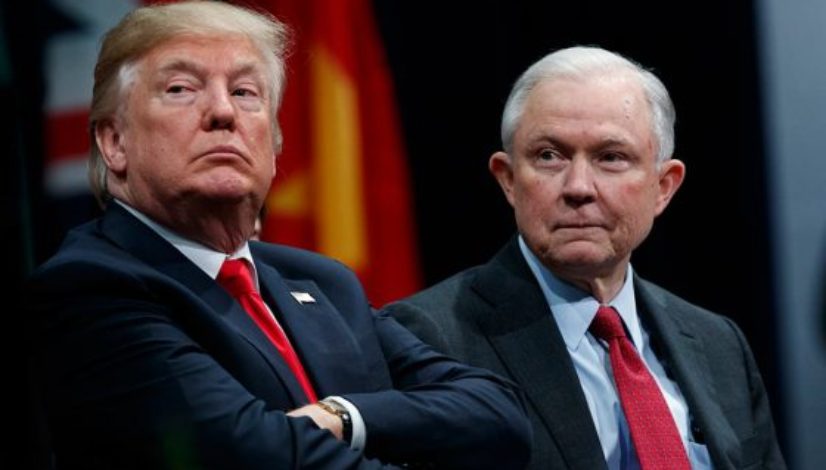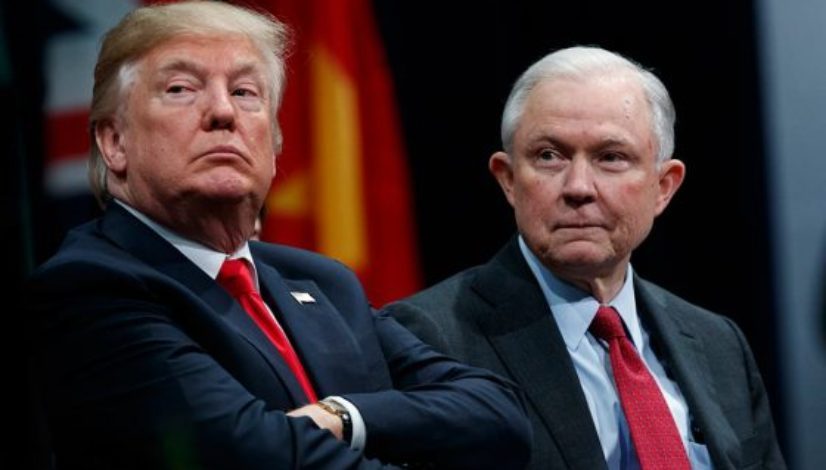What now? Experts and politicians weigh in on potential impact of Sessions’ rollback of marijuana policy

Published: Jan 4, 2018, 2:28 pm • Updated: Jan 4, 2018, 2:34 pm
By Alicia Wallace, The Cannabist Staff
Days after California became the largest U.S. state to initiate regulated sales of cannabis to adults, a wave of uncertainty has crashed over America’s cannabis industry with the Justice Department’s elimination of Obama-era guidance on marijuana enforcement.
Attorney General Jeff Sessions’ move Thursday to rescind the Cole Memo and related guidance on marijuana has the potential to upend cannabis operations that have, from Day One, operated in a vulnerable limbo between federal illegality and state legality, policy experts say.
Whether the attorney general’s actions will spell doomsday for the burgeoning cannabis industry remains to be seen. At the very least, the lack of formal guidance could stymie growth, industry observes told The Cannabist.
“I don’t think that the attorney general is doing this for window dressing,” said John Hudak, a senior fellow at the Brookings Institution and an author and expert on marijuana policy. “I think this is an area of policy that he considers dangerous, that he considers problematic, and that he wants something done about.”
Related stories
- “Extremely misguided”: Cannabis industry and policy groups weigh in on news of DOJ guideline shift
- Trump administration must battle public opinion, economics in attack on marijuana
- Cannabis stocks plunge on news that Sessions is shifting marijuana policy
- The text of Jeff Sessions’ memo to rescind Obama-era marijuana policies, and the DOJ statement
- “This is outrageous”: Politicians react to news that A.G. Sessions is rescinding the Cole Memo
What Sessions wants, Hudak said, is to scare businesses, scare states and “to put people in jail.”
The result of Sessions move is a policy void, said Bob Hoban, managing partner at Denver-based Hoban Law Group, which specializes in cannabis legal matters. It’s the effective turning back of the clock to the Bush era policy of no guidance.
“With no guidance, it basically takes the dog off of the leash,” he said.
The enforcement onus is now placed on the cadre of U.S. Attorneys operating across America, financial institutions, as well as members of Congress, Hudak and Hoban say.
Although state-authorized medical marijuana operations have some protections baked into federal law — the Rohrabacher-Blumenauer provision restricts Justice Department spending on prosecutions — adult-use programs have no such safety net.
“(The removal of the Cole Memo and related guidance) does empower U.S. Attorneys to start going after the adult-use cannabis industry,” Hudak said. “It creates uncertainty for businesses and investors.”
As such, the public statements issued and actions taken by U.S. Attorneys should be the most telling of all, said Robert Mikos, a federalism and drug law expert at Vanderbilt University.
It remains to be seen what those prosecutors would do with that discretion, Mikos said, adding that those offices have the same resource constraints today as they did yesterday. Some may choose to take an aggressive stance, while others may not.
“I don’t think it’s going to be a sea-change by itself,” he said.
Related: Politicians react to news that A.G. Sessions is rescinding the Cole Memo
One of the first indications came out of Colorado, the first state to have legal, regulated sales of adult-use marijuana.
U.S. Attorney Bob Troyer, for the District of Colorado, released the following statement:
“Today the Attorney General rescinded the Cole Memo on marijuana prosecutions, and directed that federal marijuana prosecution decisions be governed by the same principles that have long governed all of our prosecution decisions. The United States Attorney’s Office in Colorado has already been guided by these principles in marijuana prosecutions — focusing in particular on identifying and prosecuting those who create the greatest safety threats to our communities around the state. We will, consistent with the Attorney General’s latest guidance, continue to take this approach in all of our work with our law enforcement partners throughout Colorado.”
Colorado Gov. John Hickenlooper, echoing statements from the state’s lawmakers, chastised the removal of the existing guidance and indicated his approach, too, would not change.
“Thirty states comprising more than two thirds of the American people have legalized marijuana in some form. The Cole memo got it right and was foundational in guiding states’ efforts to regulate the production and distribution of marijuana,” Hickenlooper said in a statement. “Colorado has created a comprehensive regulatory system committed to supporting the will of our voters. We constantly evaluate and seek to strengthen our approach to regulation and enforcement.
“Our focus will continue to be the public health and public safety of our citizens. We are expanding efforts to eliminate the black market and keep marijuana out of the hands of minors and criminals. Today’s decision does not alter the strength of our resolve in those areas, nor does it change my constitutional responsibilities.”
Mikos’ read of Thursday’s Sessions memo was fairly measured. In particular, he made note of Sessions’ statements on Justice Department enforcement priorities already in existence.
“That sort of signals to me that maybe he’s not complementing an actual crackdown,” he said.
This story is developing and will be updated.
Topics: cole memo, consultant, Jeff Sessions, john hudak  Alicia Wallace
Alicia Wallace
Alicia Wallace joined The Cannabist in July 2016, covering national marijuana policy and business. In her 14 years as a business news reporter, her coverage has spanned topics such as the economy, natural foods, airlines, biotech, retail,…




